The Willy Haas Award is presented annually as part of cinefest to honor important international publications (book and DVD/Blu-ray) on German-language film.
Nomination proposals for the award can be sent to jury@cinefest.de .
The winners will be announced at the opening of the International Film History Conference.
The Jury 2024:
- Christiane Habich (Kronberg)
- Kay Hoffmann (Stuttgart)
- Anne Jespersen (Copenhagen)
- Uli Jung (Trier)
- Günter Krenn (Vienna)
The jury has selected five nominees from the new releases of the past 24 months in each category for the award. The winners will be announced, and the award presented, during the opening of the 37th International Film History Conference on Wednesday, 20 November 2024.
Each of the winners will receive a certificate and an original graphic from artist and filmmaker Franz Winzentsen.
The following titles were nominated in the category Book:
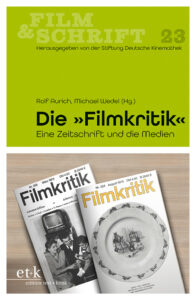
Die »Filmkritik«
Eine Zeitschrift und die Medien
by Rolf Aurich, Michael Wedel (Ed.)
Munich: edition text+kritik 2024.
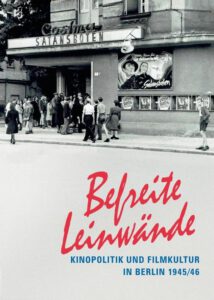
Befreite Leinwände
Kinopolitik und Filmkultur in Berlin 1945/46
by Frederik Lang (Ed.)
Vienna: Synema 2023.
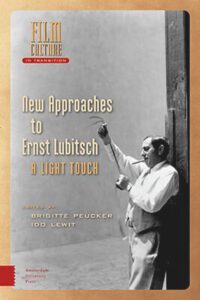
New Approaches to Ernst Lubitsch
A Light Touch
by Brigitte Peucker, Ido Lewit (Ed.)
Amsterdam: Amsterdam University Press 2024
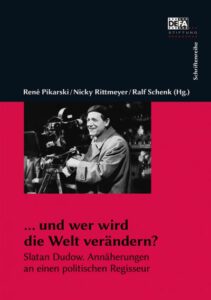
… und wer wird die Welt verändern? Slatan Dudow
Annäherungen an einen politischen Regisseur
by René Pikarski, Nicky Rittmeyer, Ralf Schenk (Ed.)
Berlin: Bertz + Fischer 2024
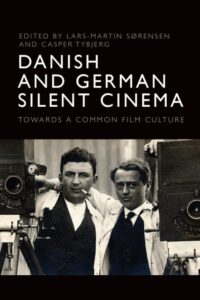
Danish and German Silent Cinema
Towards a Common Film Culture
by Lars Martin Sørensen, Casper Tybjerg (Ed.).
Edinburg: Edinburgh University Press 2023
The following editions were nominated in the category DVD/Blu-ray:
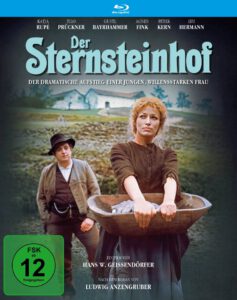
Der Sternsteinhof
FRG 1976. Dir: Hans W. Geissendörfer. Bonus material
Filmjuwelen 2024
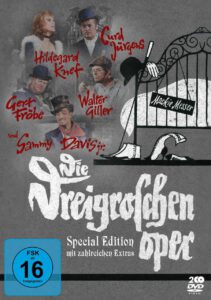
Die Dreigroschenoper
FRG/FR 1962. Dir.: Wolfgang Staudte.
Restored Special Edition
Filmjuwelen 2024.
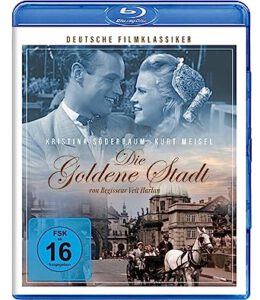
Die goldene Stadt
DE 1942. Dir: Veit Harlan. Resored Version, bonus material
Friedrich-Wilhelm-Murnau-Stiftung 2023.

Frank Beyer
Alle DEFA-Spielfilme 1957-1991
GDR 1957. Dir: Frank Beyer. 13 DVDs. Bonus material, Booklet
DEFA Filmjuwelen 2024.
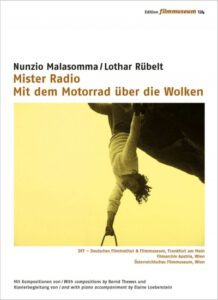
Mister Radio & Mit dem Motorrad über die Wolken
DE 1924. Dir: Nunzio Malasomma / AT 1926. Dir: Lother Rübelt. Bonus material, Booklet
Österreichisches Filmmuseum / Edition Filmmuseum 2024.
The following edition receives an Honorable Mention by the jury:
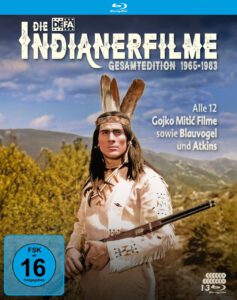
Die DEFA-Indianerfilme Gesamtedition
GDR 1966-1983. Dir: Josef Mach, Richard Groschopp, Gottfried Kolditz
DEFA Filmjuwelen 2024
Willy Haas Preis 2023
The Willy Haas Award is presented annually as part of cinefestto honor important international publications (book and DVD/Blu-ray) on German-language film.
The winners will be announced at the opening of the International Film History Conference.
The Jury 2023:
- Christiane Habich (Kronberg)
- Kay Hoffmann (Stuttgart)
- Anne Jespersen (Copenhagen)
- Uli Jung (Trier)
- Günter Krenn (Vienna)
The jury has nominated six candidates for the award from the new publications of the last 24 months in each category. The final winner was announced at the opening of the 36. International Film History Conference announced on Wednesday, November 22, 2023.
Each winner received a certificate and an original graphic by the artist and filmmaker Franz Winzentsen.
Winner of the Willy Haas Award, Category Books:
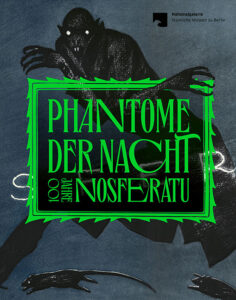
Phantome der Nacht
100 Jahre Nosferatu
by Jürgen Müller, Frank Schmidt, Kyllikki Zacharias (Ed.)
Dresden: Sandstein 2022
Comment of the Jury:
Bram Stoker is often considered the hidden name behind “Nosferatu,” but that’s only partially true. In fact, the image of the first film vampire didn’t originate from F. W. Murnau but from Albin Grau. The graphic artist, set designer, and author studied at the Dresden Academy of Fine Arts, was a member of the occult community “Fraternitas Saturni,” and in 1922, alongside designing the film’s sets, costumes, and promotional graphics, also created the mask of one of the most iconic movie monsters of all time—recognizable even by people who have never seen “Nosferatu.” This fact, along with numerous other new discoveries and interpretations, is highlighted in the beautifully designed art book
“Phantoms of the Night: 100 Years of Nosferatu” from Sandstein Verlag. The book places the film classic in the context of its art historical influences, which range from Goya’s etchings to the fantastic art and literature of the 20th century. Additionally, it explores Nosferatu’s impact on contemporary art and popular culture.
The following titles were also nominated in category Book
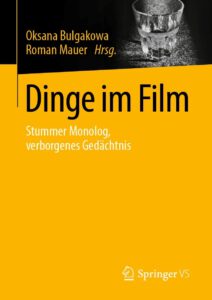
Dinge im Film
Stummer Monolog, verborgenes Gedächtnis
by Oksana Bulgakowa, Roman Mauer (Ed.)
Wiesbaden: Springer VS 2022
Comment of the Jury:
Objects are present in all film images and are often not consciously perceived. However, they can take on various functions and shape film narratives: “The object becomes a material carrier and trigger of action, a turning point in the dramaturgy, an identity marker, or an animated metonymy of the protagonist, a speaking object, a mystery” (Oksana Bulgakowa). Twenty different essays examine how objects in film can be staged to be charged with emotions and perceived in this way. The focus includes films by Eisenstein, who could assign complex meanings to objects like the glasses of a ship’s doctor, as well as Fritz Lang’s film noirs, where characters are defined through their relationship with objects. Other topics include “The Train in Film,” “The Mobile Phone: Forms and Functions in Film,” and “The Birdman and the Cinema of the 1920s.” The book addresses various film genres and eras, from silent films to science fiction, making it an exceptionally inspiring and engaging read. It sharpens the perspective, especially at a time when visual storytelling is becoming increasingly one-dimensional.
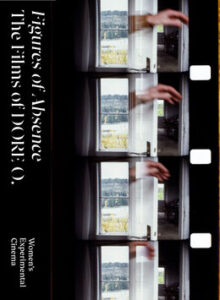
Figures of Absence
The Films of Dore O.
by Masha Matzke (Ed.)
Cologne: Filmbüro NW / Strzelecki Books 2023
Comment of the Jury:
The book provides a long-overdue tribute to the cinematic work of Dore O. (1946–2022), one of the most significant figures in German avant-garde cinema. Her poetic, deeply personal, and radical films bear a unique signature, which this volume seeks to explore. It brings together statements from the filmmaker, interviews with her and Werner Nekes, voices of colleagues and contemporaries, reviews of Dore O.’s films, and essays from contributors such as Dietrich Kuhlbrodt, Martin Langbein, Christine Noll Brinckmann, and Marie-Hélène Gutberlet. Robin Blaetz examines the influence of Dore O.’s film LAWALE on other female filmmakers. The book provides extensive insights into avant-garde cinema of the 1960s and 1970s, film funding, the reception of her films, the Hamburg Filmmakers Cooperative, and the treatment of avant-garde cinema and female filmmakers in film studies. The volume includes numerous photographs and a fold-out illustration of the 16mm reversal original of KASKARA. A definitive work on German avant-garde cinema!
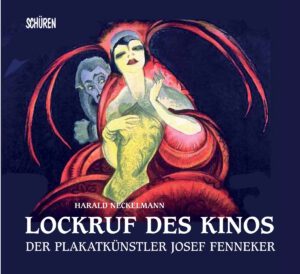
Lockruf des Kinos
Der Plakatkünstler Josef Fenneker
by Harald Neckelmann
Marburg: Schüren 2022
Comment of the Jury:
This opulently designed book about the poster artist Josef Fenneker is a true feast for all cinema enthusiasts. Even during his art studies, he designed posters for cinemas and, starting in 1919, for the Marmorhaus on Ku’damm, Berlin’s luxury cinema. He specialized in film posters for this venue. In “Lockruf des Kinos”, a selection of around 375 posters from the period between 1919 and 1925 is printed in full color. Harald Neckelmann provides knowledgeable commentary on the backgrounds of the films, the art and culture of the metropolis, and the production process of the posters. Fenneker typically received still images from the films, which he interpreted freely and colored himself. For each poster, he created his own typefaces. All of this was done under time pressure, often in just a few days. He focused on film posters because they offered “a great opportunity to apply imagination and colors to create posters of great charm and striking originality, even ones that are hard to forget.” Fenneker created posters that have become classics in their own right.
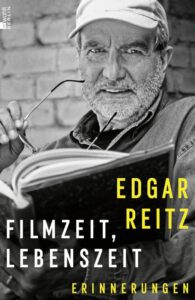
Filmzeit, Lebenszeit
Erinnerungen
by Edgar Reitz
Berlin: Rowohlt Berlin 2022
Comment of the Jury:
With his nearly 60-hour Heimat cycle, Edgar Reitz has inscribed himself into German film history in a way that few of his colleagues have. His extensive memoirs provide an in-depth look not only at his work but also recapitulate his journey from the son of a watchmaker in the Hunsrück to a theater-loving student in Munich and eventually to an internationally active industrial filmmaker. Reitz compellingly and narratively details the conditions of his work at the Ulm Institute of Design, his collaboration with Alexander Kluge, his membership in the Oberhausen Group, and his own film debut in 1967. This autobiography reflects not only his thoughtful assessment of his own work but also the author’s pronounced yet very precise storytelling flair, which he claims to have learned from his grandfather, thus paying him a loving posthumous tribute. Naturally, the Heimat complex occupies a significant portion of the book, addressing the production difficulties that have often been more speculated about than reported. Reitz clarifies the obstacles that had to be overcome with the TV networks and how much effort and time were required to do so. This illustrates Orson Welles’ well-known adage, which holds true universally, that a film director spends most of their time not directing.
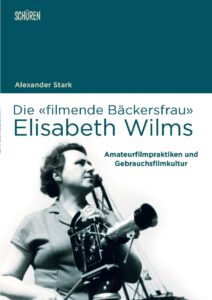
Die »filmende Bäckersfrau« Elisabeth Wilms
Amateurfilmpraktiken und Gebrauchsfilmkultur
by Alexander Stark
Marburg: Schüren 2022
Comment of the Jury:
Her early short films are known as “use films,” shot with ordinary people, addressing neglected and unexplored everyday topics: women spinning and weaving, cleaning carpets, a man on the street with a barrel organ, playing children, or scenes from her own bakery. She often filmed under very difficult conditions and received her raw film material in exchange for food. Despite it being strictly forbidden, Elisabeth Wilms filmed bombings in Münster and Dortmund. She witnessed history—both the broader narrative of war and the post-war suffering of the population—documenting daily life. The book documents her unique position as an observer and places her within the larger context of amateur film practice.
Winner in the category DVD/Blu-ray DVD/Blu-ray:
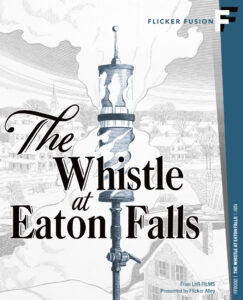
The Whistle at Eaton Falls
US 1951. Director: Robert Siodmak. Restored Version, bonus material
Flicker Alley 2022
Comment of the Jury:
The Whistle at Eaton Falls is a lesser-known film by Robert Siodmak and his last made in the USA. It is now finally accessible again. Siodmak, who fled Nazi Germany, was regarded as a master of film noir, which he confirms with this impressive film set in a working-class environment—a rare subject in Hollywood. The story revolves around a union leader (Lloyd Bridges) who is appointed as the company’s boss and is forced to make unpleasant decisions. The entire town depends on the existence of this plastics factory; many of the workers appeared in the film. A love story is an essential element of this social drama. Siodmak and his cinematographer Joseph C. Brun masterfully play with light and shadow, enhancing the dynamic of the narrative. Siodmak was disappointed with the studio conditions, which continually requested changes. Producer de Rochemont wrote: “Our goal is to dramatize in a documentary fashion that labor is an indispensable ingredient in our capitalistic system.” The insert provides information about the production background and details of the digital restoration.
The following editions were also nominated in the category DVD/Blu-ray:
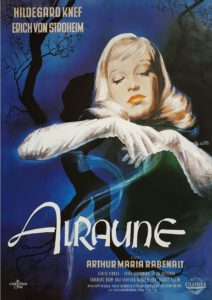
Alraune
FRG 1952. Director: Arthur Maria Rabenalt. Uncut, Mediabook
Anolis Entertainment 2023
Comment of the Jury:
With Alraune (1952) by Arthur Maria Rabenalt, based on the 1911 novel by Hanns Heinz Ewers, the first post-war film in West Germany emerged that connects to the tradition of expressionist horror films like Nosferatu and The Student of Prague. Alraune, a femme fatale created through artificial insemination, captivates men with her beauty and leads them to ruin. She is virtuously portrayed by Hildegard Knef, who strikes a balance between a cold, calculating vamp and a loving woman by the end of the film. Erich von Stroheim lends Alraune’s creator, Professor ten Brinken, a disturbing yet fascinating presence that reflects the dubious nature of his actions. The supporting roles are also well-cast, featuring Karlheinz Böhm, Harry Halm, and Trude Hesterberg. The outstanding cinematography by Friedel Behn-Grund creates a striking, contrast-rich black-and-white visual style that bathes the characters and settings in a magical light.
The Blu-ray, presented in a beautiful media book, is based on the digital restoration by the DFF and is distinguished by its excellent image quality and informative extras. It includes a booklet and an audio commentary by Dr. Rolf Giesen, providing insights into Hanns Heinz Ewers and placing the film in its historical context. A second audio commentary discusses the filming process and interesting facts about the director and the actors, particularly Hildegard Knef.

Berlin Alexanderplatz
GER 1931. Director: Phil Jutzi. Remastered
Fernsehjuwelen, Alive AG 2022
Comment of the Jury:
The film Berlin – Alexanderplatz (1930) is the first adaptation of Alfred Döblin’s novel published in 1929. The book was one of the earliest German examples of the “city novel,” designed to reflect the energy, speed, lights, traffic, and noise of modern urban life. Early sound films like this one, which recognized the potential of sound, were particularly well-suited to incorporate all these city noises, turning the city into an almost independent, fascinating, and yet dangerous character. This omnipresent character poses an unexpected challenge for Franz Biberkopf, who finds himself alone in the vast, bustling city after four years in prison.
The film follows the structure of so-called “City Symphony Films,” such as Walther Ruttmann’s Berlin: Die Sinfonie der Großstadt (1927). Ruttmann’s film undoubtedly inspired Alfred Döblin, who was writing his novel at the time of the film’s release. The idea to adapt Döblin’s successful novel came quickly, resulting in this outstanding film, for which Döblin himself contributed to the screenplay. The director was Phil Jutzi, known for his proletarian film Mutter Krausens Fahrt ins Glück (1929), with Heinrich George playing the lead role of Franz Biberkopf. Berlin – Alexanderplatz stands as a unique and significant document from the Weimar Republic and Weimar cinema.
The DVD includes a restored version of the film, a portrait of actor Heinrich George, and an informative booklet.
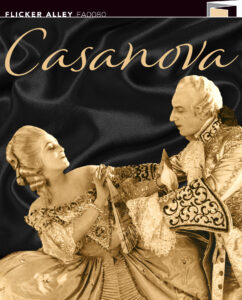
Casanova
FR 1926/27. Director: Alexandre Volkoff. Restored Version, bonus material
Flicker Alley 2022
Comment of the Jury:
Noteworthy is the lavish 24-page souvenir booklet, which resembles a miniature program. It provides a comprehensive description of the 1927 French costume film Casanova, directed by Russian filmmaker Alexander Wolkoff, in the reconstruction by the Cinémathèque Francaise, released in 2022 as a DVD and Blu-ray edition by Flicker Alley. Casanova and superlatives are synonymous, and whether it truly showcases “the largest set ever created for a film in Europe” at that time or not, the film impresses with scenes from Venice when it was not yet a tourist hotspot, along with picturesque studio sets. The accompanying music by seasoned composer Günter Buchwald is left for viewers to evaluate. Both professionals and amateurs are captivated by the manually hand-colored images, the cinematic perfection of the action sequences, and the unbroken physical presence of Russian action star Ivan Mosjoukine, who tragically died of tuberculosis in poverty just 12 years later.
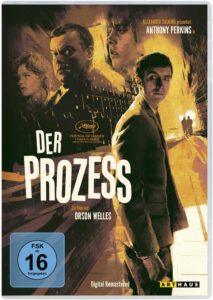
Der Prozess (Le Procés)
FR/FRG/IT 1962. Director: Orson Welles. 4k remastered
Studiocanal 2022
Comment of the Jury:
Franz Kafka wrote his novel “The Trial” between 1914 and 1915. However, his most famous work was published only in 1925, a year after his death. It tells the bizarre story of Josef K., who is arrested and condemned by the authorities without ever knowing what crime he is supposed to have committed. The narrative follows the logic of a (nightmare) dream and stands as an unparalleled pinnacle of modern dystopian literature.
In 1962, Orson Welles merged this monumental work of alienation and absurdity with his own genius, creating a unique film that has now been newly revised to mark the 60th anniversary of its premiere. The restored version was showcased at the Cannes Film Festival in 2022 and is now available on DVD. The clear black-and-white cinematography complements the nightmarish quality of the story, and the restoration particularly highlights the film’s expressionistic atmosphere.
In his adaptation, Orson Welles provided a definitive ending: Josef K. dies in an explosion. Welles explains this choice by stating that the world in 1962 was very different from Kafka’s time in 1915: “After the death of six million Jews, Kafka would have chosen a different ending. His version seems to me pre-Auschwitz.”
As bonus material, the DVD includes the 50-minute portrait This is Orson Welles from 2015.
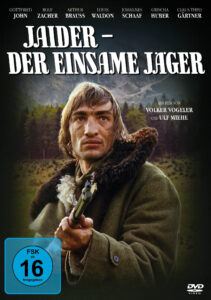
Jaider, der einsame Jäger
FRG 1970/71. Director: Volker Vogeler. Bonus material
Filmjuwelen 2023
Comment of the Jury:
Volker Vogeler’s film Jaider, der einsame Jäger belongs to the tradition of the so-called “Critical Heimatfilm,” which emerged in the late 1960s and early 1970s as part of the New German Cinema movement. This genre includes titles such as Der plötzliche Reichtum dr armen Leute von Krombach (directed by Schlöndorff) and Matthias Kneißl (directed by Hauff). In response to student protests against the established culture and politics of the Federal Republic of Germany, there was a growing interest in historical resistance groups. The clichés of the classic post-war German Heimatfilm were systematically inverted: Heimat (homeland) became a space of repression, where feudalism keeps the people in ignorance and exploitation.
Aesthetically, Jaider, der einsame Jäger unmistakably draws inspiration from contemporary Italian westerns: it features a slow narrative rhythm, taciturn characters, stark mountainous landscapes, and meager dwellings for the population. Gottfried John plays the solitary avenger who stands alone against the oppressive authorities, carrying out his plan for revenge against all odds. Contemporary critics were quite taken with the film: “Here, the new German Heimatfilm has emancipated itself from the political parable and from the criticism of this genre and its worldview, evolving into an enjoyable reinterpretation and development. Vogeler has not turned the Heimatfilm on its head, as he claims, but has finally set it upright,” wrote Wolfgang Limmer in the Süddeutsche Zeitung (July 12, 1971).
The DVD release is a long-overdue act, as it provides an opportunity to rediscover and reassess a film that has nearly fallen into obscurity today.
The following publication received an Honorable Mention by the jury:
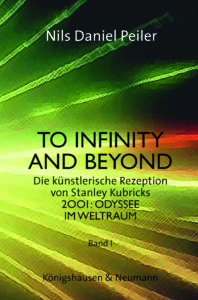
To Infinity and Beyond
Die künstlerische Rezeption von Stanley Kubricks 2001: ODYSSEE IM WELTRAUM
by Nils Daniel Peiler
Würzburg: Königshausen & Neumann 2022
Comment of the Jury:
“To Infinity and Beyond” sounds more visionary than “There and back again” and is attributed to Disney’s toy astronaut Buzz Lightyear from Toy Story. The reference to Stanley Kubrick’s 2001: A Space Odyssey becomes clear when one holds Nils Daniel Peiler’s monumental work on the subject in their hands. One might pause to consider whether it was truly necessary to write an 800-page book about the film, but Peiler’s interdisciplinary approach captivates with its insatiable collector’s zeal and the baroque sensuality with which all relevant quotes are incorporated into his media studies text: films and TV series, video clips, advertising, painting, architecture, comics… The illustrated book, which is also a hefty 344 pages long, impresses with its selection of photographs. And if the reference to Kubrick in this year’s Barbie movie has thus far escaped the author, one can only hope for a revised edition.
Willy Haas Award 2022
The Willy Haas Award is presented annually as part of cinefestto honor important international publications (book and DVD/Blu-ray) on German-language film.
The winners will be announced at the opening of the International Film History Conference
The Jury 2022:
- Christiane Habich (Kronberg)
- Britta Hartmann (Berlin)
- Anne Jespersen (Copenhagen)
- Uli Jung (Trier)
- Günter Krenn (Vienna)
The jury has nominated six books and six DVDs/Blu-rays, which were released within the last 24 months as candidates. The final winner was announced at the opening of the 35th International Film History Conference on Thursday, 17 November 2022 at the Metropolis Cinema in Hamburg
Each winner received a certificate and an original graphic by the artist and filmmaker Franz Winzentsen.
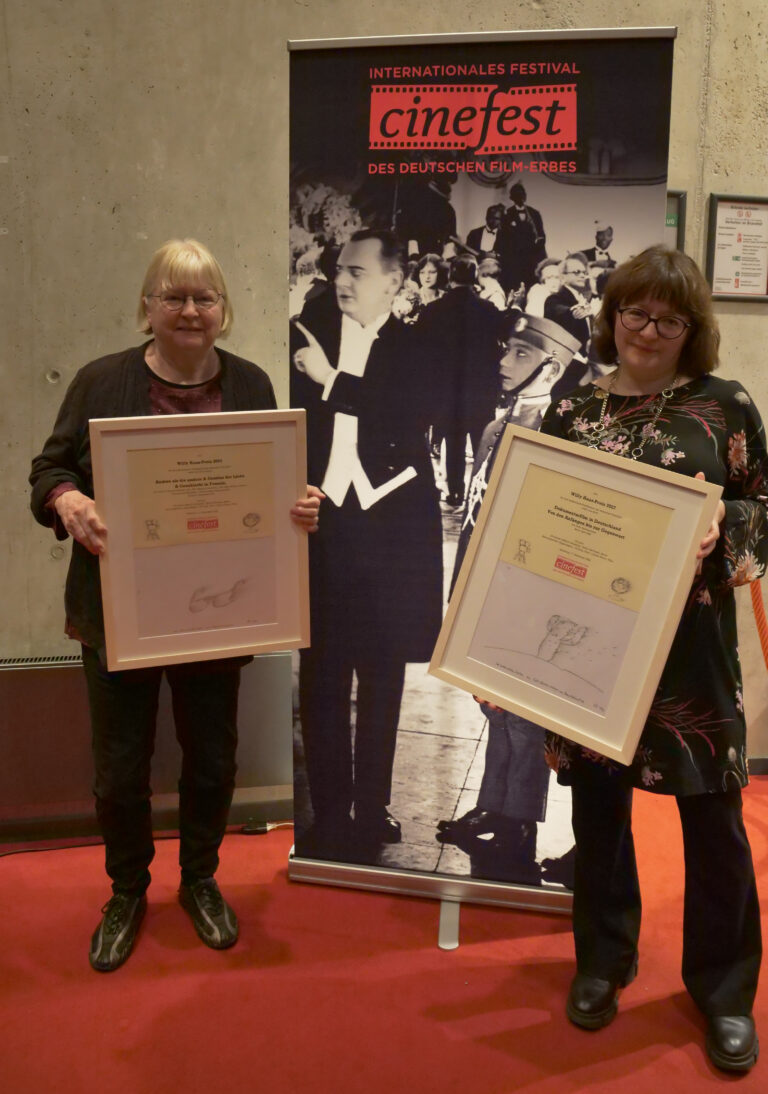
The Willy Haas Awards were presented by jury members Anne Jespersen and Britta Hartmann.
Winner of the Willy Haas Award, Category Books:
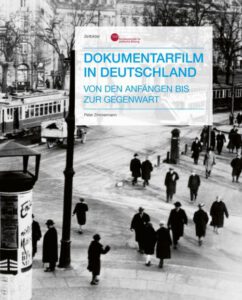
Dokumentarfilm in Deutschland.
Von den Anfängen bis zur Gegenwart.
by Peter Zimmermann. Bonn: bpb 2022.
Comment of the Jury:
Peter Zimmermann is considered one of the most profound experts on documentary films in Germany. This overall presentation represents something like the sum of his many years of journalistic work on the subject area: knowledgeable, profound in his conclusions and concise explanation, the author leads through the development of the genre from its beginnings in the Empire through the Weimar Republic with the establishment of cultural film, the Third Reich and its propaganda use, the two German states, for which the documentary serves to denounce each other, but is also profiled as a socially critical medium, to the present and the new hybrid digital formats. The historiography is oriented towards the processes of change in documentary forms, production, performance and reception, the changes in media and technology in the genre as well as the shifting social power relations and discourses. Already a standard work that is offered in the Zeitbilder series at the Federal Agency for Civic Education.
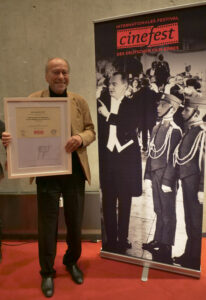
Preisträger Peter Zimmermann
The following titles were also nominated in category Book
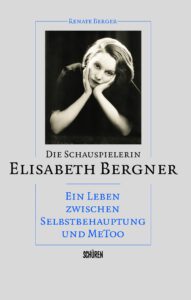
Die Schauspielerin Elisabeth Bergner.
Ein Leben zwischen Selbstbehauptung und MeToo
by Renate Berger. Marburg: Schüren 2022.
Comment of the Jury:
Renate Berger deliberately puts the question “Why?” at the beginning of her biography of the actress Elisabeth Bergner. The subtitle “A life between self-assertion and MeToo” only superficially sounds like a sales-promoting anachronism, because Bergner, according to her biographer, was one of the few women who knew how to defy a system that is patriarchal to this day. With chapters that are both short and entertaining, peppered with clever quotes and illustrations, the author traces Bergner’s career, and she manages to avoid the indecipherability of Bergner’s enigma by placing her life in the context of other people of that time (including Tilla Durieux, Irma Karczewska, Viola Bosshardt, Wilhelm Lehmbruck, Albert Ehrenstein, Paul Czinner), even briefly giving them the stage on which Bergner acts, triumphs or fails. Professor of Art and Cultural Studies Berger’s conclusion remains timeless: »What is up for debate is nothing less than the question of the conditions under which art is created, the consideration of what can be expected of those involved and where the violation of boundaries begins.«
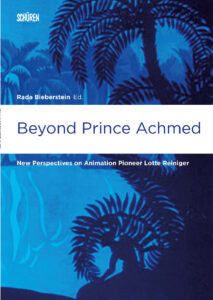
Beyond Prince Achmed. New Perspectives
on Animation Pioneer Lotte Reiniger
by Rada Bieberstein. Marburg: Schüren 2022.
Comment of the Jury:
Die für dieses von Rada Bieberstein herausgegebene Buch entstandenen Aufsätze beleuchten verschiedene Aspekte vom Leben und Werk der Trickfilmpionierin Lotte Reiniger. Das Buch zeichnet ein facettenreiches Bild der Künstlerin, die frei und selbstbewusst in ihrer Kunst gewesen ist und sich wenig um Konventionen geschert hat. Zentrales Thema ist die weibliche Kreativität in der Weimarer Republik, Reinigers Beziehungen zu anderen Künstlern und Filmschaffenden und ihre Jahre im Londoner Exil und die Freundschaft zu der Publizistin Bryher werden beleuchtet. Untersucht werden die Faszination des Orients im Weimarer Kino, die Symbolik des Schattens und die visuellen Metaphern bei Reiniger. Ein anderes Kapitel widmet sich den Schriften der Regisseurin, in denen sie Anleitungen zur Herstellung von Animationsfilmen gibt, sich aber auch mit der Filmindustrie kritisch auseinandersetzt. Ihr Einfluss auf nachfolgende Filmemacher wird deutlich bei Bruno J. Böttge, dem Chef-Animateur der DEFA, und auch für zeitgenössische südostasiatische Animateurfilmer in Malaysia und Indonesien ist Reiniger heute noch eine Inspiration.
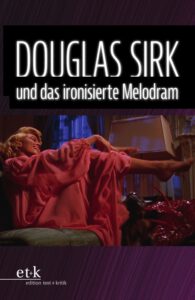
Douglas Sirk und das ironisierte Melodram
by Thomas Brandlmeier. Munich: edition text + kritik 2022.
Comment of the Jury:
Douglas Sirk / Detlef Sierck is one of the great German directors. Coming from the theater, where he was hostile to the Nazis from 1933 onwards, he switched to film. For Ufa he shot, among other things: two very successful films with Zarah Leander. In 1939 he emigrated to the Netherlands and then to the USA. There, after a few difficult years, he became Universal’s star director. His preferred genre was melodrama, which he twisted ironically. He became a role model for a younger generation of filmmakers, including R. W. Fassbinder. Thomas Brandlmeier’s insightful book stays very close to the films. Supported by numerous photos, he describes recurring motifs from Sirk’s films such as mirrors, windows or masks and their meaning. Each individual film is discussed while Sirk’s direction is examined in more detail. This book is rounded off by a filmography, references and an index. A standard work for all Sirk lovers.

Der Traum vom großen Kino.
Die Unternehmensgeschichte er Bavaria Film GmbH von 1945 bis 1994
by Christoph Menardi. Munich: edition text + kritik 2022.
Comment of the Jury:
Bavaria, which emerged in the early 1930s from the remnants of the predecessor company Emelka, is still the largest media company in southern Germany and has been in direct competition with the Babelsberg company since the fall of the Wall at the latest. The company, which was nationalized during the Nazi era, was initially controlled by the Allies in trust from 1945 and was reprivatized in 1956 in the financing of, among others, two major German banks and AGFA. In a very detailed study, Christoph Menardi researched the complex and changeable economic development of the company between 1945 and 1994 – the company archive was no longer available to him for the rest of the period – and in doing so, he retraced the company strategies, which always tried to adapt to constantly changing economic and technological market-relevant changes, in their film and media business tactics under different company names – Bavaria Filmkunst AG, Bavaria Atelier GmbH. The majority takeover by WDR and SDR is documented in detail, as is the background to Bavaria’s global successes such as Das Boot and Die unendliche Geschichte. A qualified economic history of a German media group, of which experts can only wish for more.
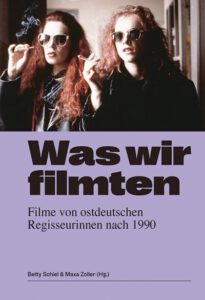
Was wir filmten. Filme von ostdeutschen Regisseurinnen nach 1990
Edited by Betty Schiel, Maxa Zoller. Berlin: Bertz + Fischer 2021.
Comment of the Jury:
The year 1989/90 is considered a short period of anarchy for filmmakers from the GDR: the old men had left, the new ones had not yet taken over. A lot seemed possible; spontaneous, non-conformist films were made, many by women. But what happened next for the female directors from the GDR after “reunification”? Were they able to continue working? Which films were made? Under which conditions? And how do they speak of a country and a time? The collection of texts follows an exchange at the FrauenFilmFestival Dortmund/Cologne 30 years after the fall of communism. The editors characterize the character of the volume as “memory images and speech acts” – a multi-voiced, multi-perspective book about and with East German filmmakers, including Tamara Trampe, Helke Misselwitz, Petra Tschörtner, Angelika Nguyen, Ines Johnson-Spain, that corresponds to this approach in the graphic design. A collection of different text forms that invite you to browse and remember a time of departure and new beginnings, but also a phase of stumbling, falling, picking yourself up again and moving on.
Winner of the Willy Haas Award, Category DVD / Blu-ray:
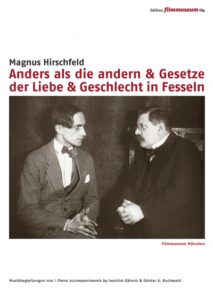
Anders als die Andern & Gesetze der Liebe & Geschlecht in Fesseln
Director: Richard Oswald / Magnus Hirschfeld / Wilhelm Dieterle. Bonusmaterial, Booklet, neu erweiterte Auflage.
Edition Filmmusuem 2022
Comment of the Jury:
In the period between the collapse of the Empire and the implementation of the Weimar Reich Film Act in 1920, pre-censorship for films was suspended. Richard Oswald, already a well-known director and producer at the time, took the opportunity to make a series of so-called “education films” that dealt with socially marginalized topics – prostitution, homosexuality. Anders als die Anderen, for which he secured the support of the pioneer of sexual research Magnus Hirschfeld, is to this day the most controversial, but at the same time rarely seen, example. It was banned for the entire Reich on October 16, 1920 under the new legislation. The double DVD from Edition Filmmuseum not only makes Oswald’s film available for private use, but also Hirschfeld’s documentary Gesetze der Liebe (1927) and Wilhelm Dieterle’s feature film Geschlecht in Fesseln (1928) available again. A 20-page booklet and a ROM section provide a historical classification of all films and additional original documents from the context of the films, among other things – surprisingly but also tellingly – an exchange of letters between Oswald and Veit Harlan, who brought his film Anders als Du und ich (§ 175) to cinemas in 1958 with a very negative connotation of homosexuality. A carefully designed and exemplary edition. A carefully designed and exemplary edition.
The following editions were also nominated in the category DVD/Blu-ray:
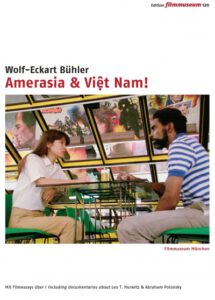
Amerasia & Việt Nam!
Directed by: Wolf-Eckart Bühler. Bonus material, Booklet.
Edition Filmmusuem 2022
Comment of the Jury:
The film critic and director Wolf-Eckart Bühler has unfortunately and unfairly been forgotten. He wrote in the magazine »Filmkritik« and created groundbreaking thematic magazines, for example about the police film or Hank Worden. Bühler’s left-wing political commitment also shaped his film work. In the films Amerasia and Việt Nam! he deals with the consequences of the Vietnam War in a very personal way. Another topic that preoccupied him was the persecution of left-wing filmmakers during the McCarthy era. The films on the DVD about Leo T. Hurwitz, Irving Lerner and Abraham Polonsky as well as the radio play Reisen am Ende der Nacht: Sterling Hayden bear witness to this. A radio broadcast from 1974 is dedicated to the history of the Filmkritik. Bühler’s TV and radio programs from the 1970s and 1980s in particular make you astonished today at the high quality of television and radio back then, and it is a great achievement to have made them available again on DVD. The booklet contains an essay by Olaf Möller as well as texts and letters from Bühler himself and a moving obituary by Hans Schifferle.
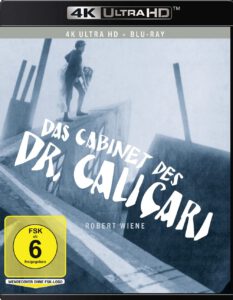
Das Cabinet des Dr. Caligari
Directed by: Robert Wiene. Bonus material, restored Version, Blu-ray /
4k Ultra HD. Studio Hamburg Enterprises 2022.
Comment of the Jury:
As we all know, Das Cabinet des Dr. Caligari is a milestone in German cinema. When the film premiered in February 1920, the film press celebrated it as »the entry of art into the film world.« It was a complex story in a highly stylized, expressionistic set. Expressionism was everywhere and Caligari came at just the right time. The film has had a varied video career in the past, but this Blu-ray and 4K Ultra HD release appears to be the definitive version. The restored version is of the highest quality. The film feels sharp, fresh and new, meticulously made by L’immagine Ritrovata. The bonus material is also at the highest level. This version provides both interesting insights into the complicated technical aspects of restoration and digitization as well as a documentation by Rüdiger Suchsland, Die Geburt des Horrors im ersten Weltkrieg. It offers an interesting perspective on Das Cabinet des Dr. Caligari, as an anti-bourgeois response to the First World War and the militaristic thinking that caused the war. In Caligari nothing is straight, nothing is ordered – in other words: the exact opposite of militaristic.
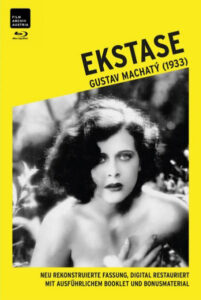
Ekstase
Director: Gustav Machatý. DVD / Blu-ray, bonus material, booklet, newly reconstructed version, digitally restored. Filmarchiv Austria 2021.
Comment of the Jury:
Ekstase is a completely exceptional film in many ways, and its restoration presented some unique challenges. The original film, which premiered in Vienna in February 1933, no longer exists. However, the reconstruction, which is on the DVD/Blu-ray, is as close to the original as possible. The film had censorship problems from the beginning, causing scenes to be cut or manipulated. The bonus material on the disc and booklet illustrate this very well. Most striking is the visual comparison between six different versions of the final scene. An essential aspect of the film are the highly aesthetic noir-like compositions. The restoration has meticulously cleaned and recreated the cinematography, where black is truly black. Of particular interest on the Blu-ray is the film Symphonie der Liebe. Since the film Ekstase was banned in Germany and other countries, an extensively manipulated version was released in Germany in 1935 under the title Symphonie der Liebe. Nowadays, the film has the status of an independent German film. However, Symphonie der Liebe eliminated all the important elements, which is why Ekstase is now considered an innovative, creative and daring film: the famous scenes with Hedy Lamarr swimming naked or, even more groundbreaking, the honest and open portrayal of female sexuality. Censorship made sure to remove all the things that made Ekstase such an important film.
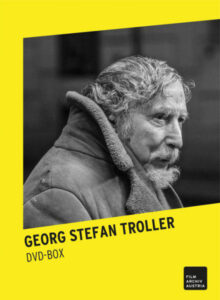
Georg Stefan Troller
Directed by: Georg Stefan Troller. Anniversary DVD box, 6 DVDs, bonus material, booklet. Filmarchiv Austria 2021.
Comment of the Jury:
On the occasion of the 100th of Georg Stefan Troller’s birthday, the Austrian Film Museum is releasing an extensive DVD box set featuring a total of 27 of his shorter and longer reports, semi-scenic works, and documentaries commissioned by German television. This includes contributions about Edith Piaf and Josephine Baker from the Pariser Journal, which was broadcast by WDR between 1962 and 1971, as well as 19 of his 70 films from the ZDF series Personenbeschreibungen (1972 – 1993). Also included: the experimental film Am Rande der bewohnbaren Welt. Das Leben des Dichters Arthur Rimbaud aus dem Jahr 1971. The selection is excellent. Included are the films about Ron Kovac, Muhammad Ali, Peter Handke and Simone Weil, as well as the haunting Begegnung im Knast, as well as a current film about Georg Stefan Troller. The edition invites you to discover or rediscover the work of the great television documentarian by freeing the films from the archives of broadcasters, which are difficult to access.
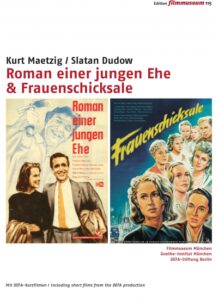
Roman einer jungen Ehe & Frauenschicksale
Directed by: Kurt Maetzig / Slatan Dudow. Bonus material, Booklet.
Edition Filmmuseum 2021.
Comment of the Jury:
Edition Filmmuseum’s No. 115 combines two productions from 1952, when the continuation of politics by other means was already approaching a frozen state. In Roman einer jungen Ehe Kurt Maetzig paraphrasiert in Roman einer jungen Eheanhand eines Paares die damalige (Un)Möglichkeit einer Wiedervereinigung Deutschlands. Slatan Dudow’s Frauenschicksale focuses on the fate of women after two devastating world wars by reporting on the collateral damage of a “Bel Hallodri” in the lives of young women. Described as »DEFA’s first women’s film«, the film was rejected by the federal executive board of the Democratic Women’s Association as »atypical.« Dudow’s reaction is printed in the comprehensively informative booklet that accompanies the DVD. The programs are supplemented by two documentary films, KgU – Kampfgruppe der Unmenschlichkeit (1956) uand Tageskurs 1:4 (1957), which are dedicated to an anti-communist movement and the currency reform of 1948. Neither of the two »main films« wants to be seen as a »key film«; their aim was, as Kurt Maetzig put it, »to make the meaning of the events that really took place understandable using the means of art.«
Willy Haas Award 2022
Jury 2021:
- Christiane Habich (Kronberg)
- Oliver Hanley (Potsdam)
- Uli Jung (Trier)
- Günter Krenn (Vienna)
- Claudia Lenssen (Berlin)
The jury nominated five candidates per category for the prize from the new publications of the last 24 months. The final winner was announced at the opening of the 34th International Film History Congress on Thursday 18 November 2021.
Each winner received a certificate and an original graphic by the artist and filmmaker Franz Winzentsen.
Winner of the Willy Haas Award, Category Books:
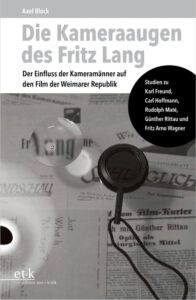
Die Kameraaugen des Fritz Lang.
Der Einfluss der Kameramänner auf den Film der Weimarer Republik
by Axel Block. Munich: edition text + kritik 2020.
Comment of the Jury:
Cinematographers played a key creative role in Weimar cinema, yet their work has often been criminally neglected by film historians. In his book, Axel Block analyzes the work of five Weimar-era cinematographers with respect to two films from their respective oeuvres, contrasting in each case a film by Fritz Lang with a film by another director. In so doing, Block is able to elaborate both on Lang’s style as well as the aesthetic influence Lang’s cinematographers had on him. A cinematographer himself, Block takes an in-depth, expert look at selected sequences from the specific films and offers new insights into the visual design of several classics of Weimar cinema. Of great interest, moreover, are the indications of how the introduction of sound in cinema also marked the beginning of the search for a new visual language. In an age in which the importance of the image is increasingly sidelined in favor of narrative, Block’s book comes as a breath of fresh air by emphasizing the narrative power of expressive visuals. Axel Block thus plugs a significant gap, and his book will hopefully inspire further research.
The following books were also shortlisted for the award:
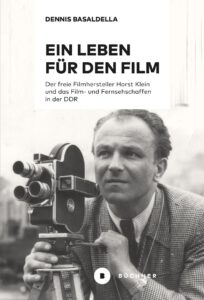
Ein Leben für den Film. Der freie Filmhersteller Horst Klein und das Film- und Fernsehschaffen in der DDR
by Dennis Basaldella. Marburg: Büchner 2020.
Comment of the Jury:
Following Ralf Forster’s Greif zur Kamera, gib der Freizeit einen Sinn. Amateurfilm in der DDR (nominated for the Willy Haas Award in 2019), media studies scholar Dennis Basaldella has now made another important contribution to the reappraisal of East German film history beyond DEFA, shedding light on a comparatively unknown side of the film industry in the GDR. The 348-page monograph, which stems from the author’s PhD dissertation at the University of Hamburg, focuses on the individual Horst Klein (1920-1994), whose career as a »freelance filmmaker« in the GDR seems both typical and atypical. In this micro-study, Klein’s career stands in for an entire profession that has hitherto been largely neglected by researchers. In his detailed investigation and meticulous (re)construction of Klein’s life and work, the author conducted, for the first time, a thorough, systematic, and scholarly analysis of a unique source: Horst Klein’s personal estate preserved at Filmmuseum Potsdam. A commendable effort.
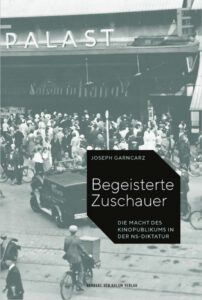
Begeisterte Zuschauer: Die Macht des Kinopublikums in der NS-Diktatur
by Joseph Garncarz. Cologne: Herbert von Halem 2020.
Comment of the Jury:
For Joseph Garncarz, the question of the preferences of cinema-going audiences in Nazi Germany is essential for a better understanding of Germany’s (film) history during the Third Reich. To tackle this question, Garncarz has analyzed a multitude of statistics pertaining to films screened between 1938 and 1945 and come to the astonishing (and no less controversial) conclusion that public taste would have had an influence on the film market during this period. The author first surprises the reader with a very personal family history detailed at the outset of his book. He then proceeds to examine the audience reception of Nazi German film production in Berlin cinemas using the POPSTAT method developed by the British economist John Sedgwick. This investigation is supplemented with a look at U.S. films of the time as well as a chapter on post-war re-release screenings of Nazi German productions
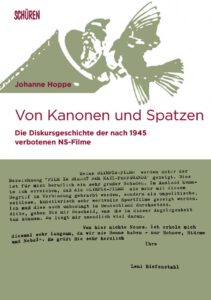
Von Kanonen und Spatzen: Die Diskursgeschichte der nach 1945 verbotenen NS-Filme
by Johanne Hoppe. Marburg: Schüren 2021
Comment of the Jury:
In her richly researched PhD dissertation Johanne Hoppe investigates the post-war fate of the films produced during the Third Reich. She looks at how the allied powers dealt with the Nazi film heritage; its (inadequate) reappraisal in the FRG and the role of the FSK. A particularly interesting chapter is devoted to how the Nazi film heritage was dealt with in the GDR, which stands in marked contrast to the West German approach. The allied powers banned numerous films (up to 385 at one point) for their glorification of National Socialism, racist content, or anti-allied propaganda among other reasons. In most cases the films were censored, only a few were banned outright. A mere few years after the end of the Second World War, many of the feature films made in Nazi Germany were screened again in West German cinemas. Both the allied powers and the responsible German institutions were driven by economic interests. This is particularly evident in the exploitation of Nazi films in cinemas then later television and on VHS and DVD, both within Germany and abroad. A historical-critical reappraisal of the Nazi German films has fallen by the wayside, not least since the banned films mostly only survive in the post-war censored versions. Demands made as far back as 1977 that the films be restored to their original uncut state unfortunately were ignored. In her conclusion, the author proposes tracing the history of the versions that resulted from post-war censorship requirements, which would indeed be a desirable undertaking.
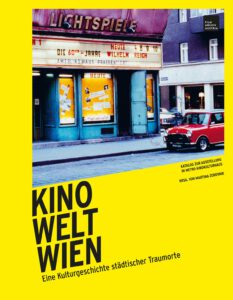
Kino Welt Wien. Eine Kulturgeschichte städtischer Traumorte. Katalog zur Ausstellung
Edited by Martina Zerovnik. Vienna: Filmarchiv Austria 2020
Comment of the Jury:
»You didn’t go to certain movies, you went to the movies« was an attitude that shaped urban culture for more than a century. Kino Welt Wien, the richly illustrated companion volume to an exhibition that ran at the Metro Kinokulturhaus in Vienna until January 2021, embarks on a journey through the often barely visible traces of this everyday leisure activity which for so long was taken for granted. Featuring a wealth of fascinating photographs and documents, and with a street map enclosed, the catalog charts the large number of now defunct cinemas in Vienna, providing vivid insights into the diverse range of architectural and interior design styles as well as the seductive language of their neon signs that once characterized the cityscape. The essays vividly reflect the periods of economic and cultural-political development of Vienna’s cinematic landscape, including its historical annexation by Nazi Germany. This informative trip through time forms an enchanting monument to the cinema as a social setting »between dreams and reality«.
Winner of the Willy Haas Award, Category DVD / Blu-ray:
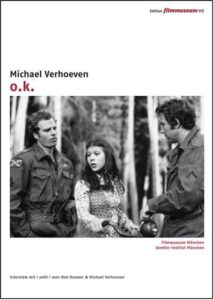
o.k.
Dir: Michael Verhoeven. DVD. Bonus material + Booklet. film & kunst GmbH / Filmmuseum München / Goethe-Institut München 2020
(Edition Filmmuseum 116).
Comment of the Jury:
Michael Verhoeven’s film o.k. caused a scandal when it was presented at the Berlinale in 1970, leading to the premature end of the festival that year. In the wake of this event, the film played only for a brief time in cinemas before suffering an undeserved fate and lapsing into decades-long obscurity. Adapted by Verhoeven from his own stage play, o.k. is based on a true incident from the Vietnam War. A group of soldiers rape and subsequently murder a Vietnamese woman. The director relocates the story to Bavaria and thus into the reality of the (then) contemporary West German audience. Viewed today, the film has lost none of its explosive power. The impressive young cast, which includes Eva Mattes, Friedrich von Thun and Rolf Zacher, performs with a skillful combination of restraint and forcefulness. Film & Kunst GmbH and the Munich Film Museum have now released the film, freshly restored in 2K from the camera negative, in an excellent DVD edition in the “Edition Filmmuseum” series. The extra features include an extensive filmed conversation between director Verhoeven and producer Rob Houwer, as well as Verhoeven’s equally rare short film Tische(Tables, 1969). In the informative booklet, Stefan Drößler recounts in detail the history of the Berlinale scandal as well as the legal disputes with Warner Bros. that hindered the film’s theatrical release.
The following books were also shortlisted for the award:
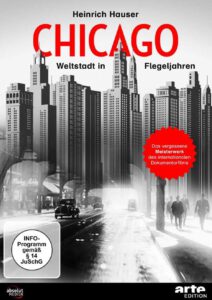
Chicago - Weltstadt in Flegeljahren
Dir: Heinrich Hauser. DVD and Blu-ray. Bonus material.
Absolut Medien 2020.
Comment of the Jury:
The separate DVD and Blu-ray releases of Chicago – Weltstadt in Flegeljahren celebrate the rediscovery of an outstanding historical portrait of the eponymous city. All but forgotten today, the adventurer and cosmopolitan, writer, photographer and filmmaker Heinrich Hauser immersed himself as an unbiased tourist in the vibrant life of America’s second largest metropolis in 1931. His gripping impressions of the speed and density of urban traffic, the seemingly futuristic grandiose high-rise architecture, the ultra-modern standard of engineered industrial processes, and the extreme disparity between rich and poor as seen on the streets of the working-class city easily rival the more famous »city symphonies« of the silent era. Hauser’s visual sense for the city’s jazzy rhythm together with the recorded passages from his travel diary as well as Andy Klein’s newly composed, subtly scored soundtrack make the restored version of his unjustly barely known film a veritable experience.
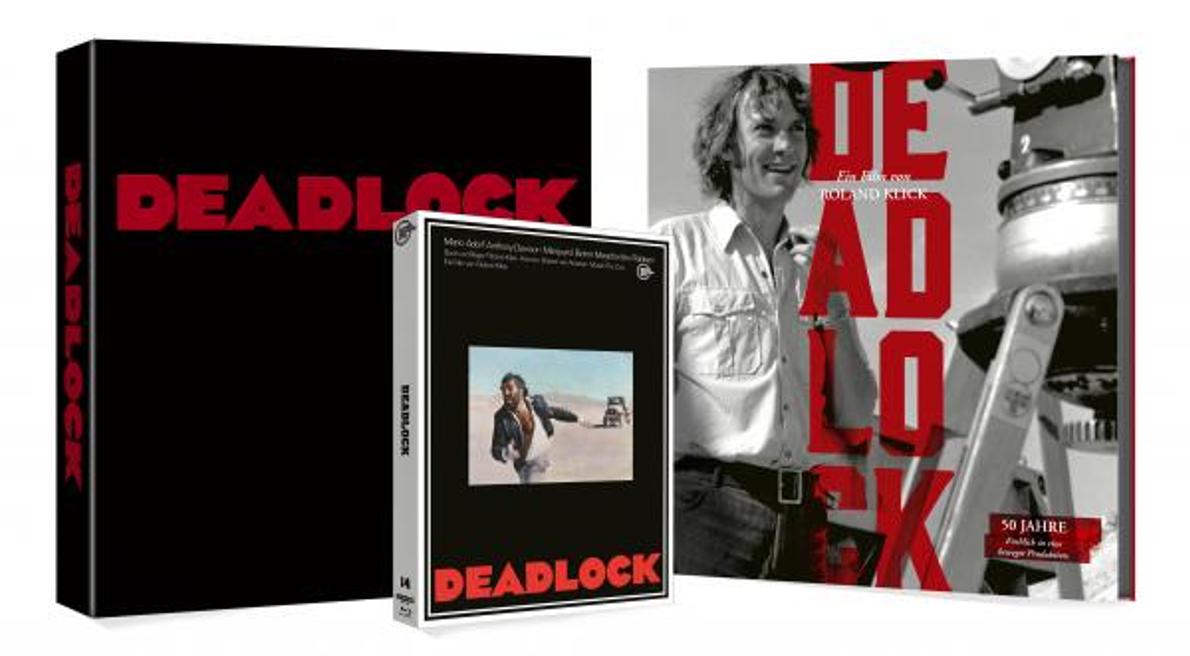
Deadlock - 50 Jahre Jubiläums-Edition
Dir: Roland Klick. Blu-ray. Bonus material + Booklet, restored version. Subkultur 2021.
Comment of the Jury:
With the latest release in its »Edition Deutsche Vita« series, the Subkultur Entertainment label has surpassed even its own high quality standards; an all the more remarkable achievement considering how many exemplary editions have already emerged from the label. That a number of these have met with acclaim from the Willy Haas Award juries in the past only serves as proof of this fact. In this 50th anniversary edition of Deadlock, Roland Klick’s spaghetti western alla tedesca is presented for the first time in 4K Ultra HD format as well as on Blu-ray in a breathtaking new digital transfer. On both discs, the main feature is complemented by the now customary plethora of extras, some of which are available here for the first time (such as the various alternate versions of the opening credits and the film’s ending). The classy cardboard packaging with its striking black and red design also houses a hardback photo-book featuring glossy black and white behind-the-scenes stills from Filmmuseum Düsseldorf’s archival collections. Even though Klick’s cult film already appeared in a high-quality DVD edition back in 2014, one gets the feeling of experiencing the film as if for the very first time in this impressive new edition.
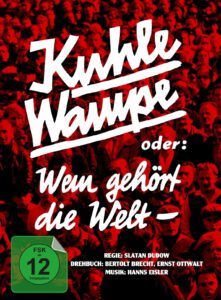
Kuhle Wampe oder Wem gehört die Welt?
Dir: Slatan Dudow. Mediabook with DVD and Blu-ray, Booklet.
Atlas-Film 2020.
Comment of the Jury:
Pigeonholed by many as the »only unambiguously communist film of the Weimar Republic«, Kuhle Wampe remains one of the most cited productions of that era. The 2020 restoration by the Deutsche Kinemathek, the British Film Institute National Archive, the Cinémathèque Suisse and Praesens-Film appears for the first time on DVD and Blu-ray in this mediabook release from Atlas-Film. The picture and sound quality have been vastly improved compared to previous versions, and the accompanying booklet includes contemporary statements by Rudolf Arnheim, Bertolt Brecht, Herbert Jhering, and Georg Höllering, as well as the film’s censorship record issued by the Filmprüfstelle Berlin. Such a film, the Prüfstelle warned in 1932, would »shake the very foundations of the state« and must be diminished to such an extent that »any state-threatening or immoral effects are no longer to be feared.«
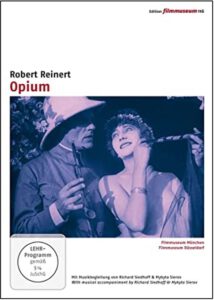
Opium
Dir: Robert Reinert. DVD. Bonus material + Booklet. film & kunst GmbH / Filmmuseum München / Filmmuseum Düsseldorf
(Edition Filmmuseum 117).
Comment of the Jury:
For a long time, Robert Reinert’s film Opium (1919) was available only in incomplete and poor quality copies. In 2018, the film museums in Munich and Düsseldorf succeeded in carrying out a reconstruction from three nitrate film elements that not only reproduces the original color tints and intertitles in different visual styles, but also comes close to restoring the censorship length. The restored version forms the core of this DVD edition, which also includes some scene comparisons and an accompanying booklet containing a biography of the director as well as contemporary reviews and an early text by Reinert. The set also features rare surviving fragments of Reinert’s otherwise lost two-part monumental film Sterbende Völker (1922). Now another key work from the surviving remains of the oeuvre of the once famous, now largely forgotten filmmaker Robert Reinert is once again available in an exemplary edition. This release serves as a welcome addition to Filmmuseum München’s existing DVD release of Reinert’s subsequent film Nerven (1919), nominated for the Willy Haas Award in 2009.
The following title receives an Honorable Mention by the jury:
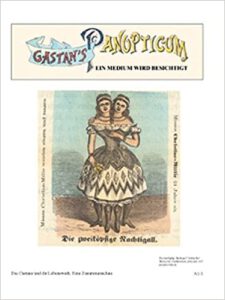
Castan's Panopticum. Ein Medium wird besichtigt: Die Castans und ihr Lebenswerk. Eine Zusammenschau
by Angelika Friederici. Berlin. Karl-Robert Schütze 2020.
Comment of the Jury:
As popular entertainment venues, wax museums were an important precursor to the cinema and, perhaps unsurprisingly, both an influence on and subject in early cinema at the turn of the century. This is especially true of Castan’s Panoptikum in Berlin, which was filmed by Lumière cameramen as early as 1896. This detailed account of the history of Castan’s business enterprise is the result of years of painstaking research conducted in numerous archives and, in light of its opulent layout, represents an impressive feat of publishing.
Willy Haas-Preise 2020
Jury members 2020:
- Peter Bossen (Hamburg)
- Christiane Habich (Kronberg)
- Oliver Hanley (Potsdam)
- Uli Jung (Trier)
- Thomas Worschech (Frankfurt)
The jury has nominated five candidates for the category Book and DVD/Blu-rayfrom new publications of the last 24 months. The winners were announced at the opening of the 33rd International Film History Conference which was held online on Thursday, November 19, 2020.
The winners were each awarded a framed certificate which features an original design by artist and filmmaker Franz Winzentsen.
You are currently viewing a placeholder content from Default. To access the actual content, click the button below. Please note that doing so will share data with third-party providers.
More InformationWinner of the Willy Haas Award, Category Books:
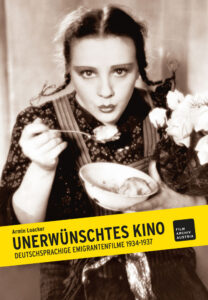
Unerwünschtes Kino: Deutschsprachige Emigrantenfilme 1934-1937
by Armin Loacker. Vienna: Filmarchiv Austria 2019.
Comment of the Jury:
Working conditions for Jewish filmmakers and actors had already become severely restricted in Germany when the Austrian film industry began conducting its endeavors in line with the German Reichsfilmkammer in order to gain access to the German film market from 1933 on. The resulting modestly scaled local film production was capable of recouping its costs in Austria and, up to the outbreak of the Second World War, in a small number of Eastern European countries. It also managed to provide work and a modest income for Jewish artists and performers. In his book, Armin Loacker meticulously retraces this context and provides detailed biographical information on the key players. The commendable and insightful historical research is embellished by numerous lavish, high-quality illustrations.
The following books were also shortlisted for the award:
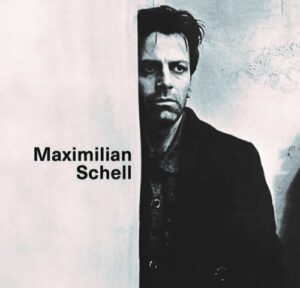
Maximilian Schell
Edited by Isabelle Louise Bastian, Hans-Peter Reichmann. Frankfurt: DFF – Deutsches Filminstitut & Filmmuseum (Verlag) 2019.
Comment of the Jury:
As a companion piece to its exhibition devoted to actor-director Maximilian Schell, the DFF – Deutsches Filminstitut & Filmmuseum in Frankfurt has published this magnificent volume filled with informative essays that illuminate various aspects of this multifaceted artist: his career as an actor of stage and screen, his work as a director, his documentary about Marlene Dietrich. Readers become acquainted with Schnell the art collector, the family man (who once devoted a filmic portrait to his sister Maria), and the translator. The latter is exemplified by a fascinating essay, written on the occasion of a performance of “Hamlet” at the Deutsches Theater, that deals with Schlegel’s translation of Shakespeare’s play and thus provides a unique glimpse into the actor’s artistic process. The texts are supplemented by a wide selection of exquisitely reproduced photographs and documents, including letters from Marlene Dietrich and Schell himself. The book is crowned by a short biography as well as extensive data on Schell’s work for film and theater.
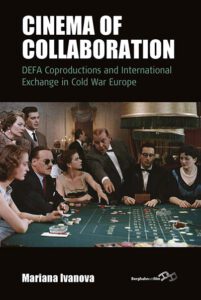
Cinema of Collaboration. DEFA Coproductions and International Exchange in Cold War Europe
by Mariana Ivanova. Oxford/NewYork: Berghahn Books 2019.
Comment of the Jury:
Mariana Ivanova, a Germanist and film scholar from Bulgaria, long resident in the USA, has repeatedly dealt with the work of the state-run East German film production company, DEFA, both in her writings as well as in a series of video documentaries. In doing so, she has made a significant contribution to the dissemination of DEFA history and its reassessment outside the German-speaking world. With her English-language monograph Mit ihrer 2019 bei Berghahn erschienenen englischsprachigen Monografie »Cinema of Collaboration. DEFA Coproductions and International Exchange in Cold War Europe« , published by Berghahn in 2019, the author has turned her attention to DEFA’s international cooperation with production companies in both Eastern and Western countries. For her extensive and impressive research, Ivanova has drawn on a range of relevant sources from public and private archives, many of which she has managed to bring to light for the first time. The result is a thoroughly engaging 292-page tome on a little-known page of DEFA’s history that can be appreciated by DEFA aficionados and novices alike, and which testifies as to why Ivanova specifically was chosen to head the renowned DEFA Film Library at the University of Amherst in 2019.
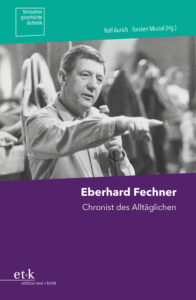
Eberhard Fechner. Chronist des Alltäglichen
Edited by Torsten Musial, Rolf Aurich. Munich: et+k 2019.
Comment of the Jury:
Eberhard Fechner’s (1927-1992) feature films and documentaries rank among the most outstanding to emerge from West German television between the 1960s and the 1980s. Initially a theater actor, Fechner started appearing in feature films from 1955. Later he became one of the most important documentary filmmakers to work in West German television, with audience figures in the millions. His most significant work, Der Prozess(1984), a three-part documentary on the Majdanek trials in Düsseldorf, was the end-result of over eight years of research. This volume, edited by Rolf Aurich and Torsten Musial, draws for the first time on Eberhard Fechner’s estate, preserved at the Berlin Academy of Arts. The informative contributions explore the various facets of Fechner’s work, including his unrealized projects. A meticulously researched chronicle, an extensive catalog raisonné and carefully selected, high-quality illustrations round off this engaging publication on the artistic oeuvre of Eberhard Fechner.
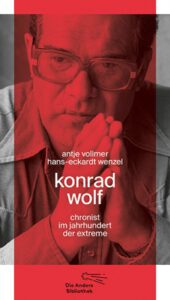
Konrad Wolf: Chronist im Jahrhundert der Extreme
by Antje Vollmer, Hans-Eckardt Wenzel. Berlin: Die Andere Bibliothek 2019.
Comment of the Jury:
Extensive historical sources and interviews with contemporary witnesses provide the fundament for this biography of the most important East German film director and long-time president of the Academy of Arts of the GDR. Far more than a mere retelling of Konrad Wolf’s life story, the book also thoroughly examines his family background, especially the influence of his father, as well as the many contemporary historical events and upheavals he lived through. The authors, West German politician Antje Vollmer and East German singer-songwriter Hans-Eckardt Wenzel, take the liberty to recount the life stories of the “supporting players” in Wolf’s biographical narrative and do not shy away from speculations and pathos. As a result, they succeed in getting very close to the person behind the name Konrad Wolf, especially his (supposed) contradictions and inner conflict. Less preoccupied with Wolf’s work as a filmmaker, the authors are rather more interested in presenting his biography as exemplary for a specific historical period, something they have succeeded in doing superbly. A highlight of biographical literature.
Winner of the Willy Haas Award, Category DVD / Blu-ray:
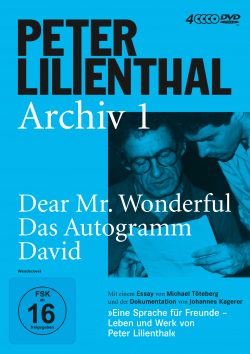
Peter Lilienthal Archiv 1
Directed by: Peter Lilienthal. DVD. Digital remastered.Booklet + Extras. Von Vietinghoff Filmproduktion / Lighthouse Home Entertainment 2019.
Comment of the Jury:
The extensive oeuvre of 90-year-old filmmaker Peter Lilienthal spans a period of 50 years. Once a core part of the New German Cinema, his films are now difficult to access and have largely disappeared from cinema and television screens. This compact 4-disc DVD set, supervised by producer Joachim von Vietinghoff, includes three award-winning feature films: David (1979, FRG), Dear Mr. Wonderful (1981/82, FRG), Das Autogramm / L’Autographe (1983/84, FRG/FR). The bonus documentary by Johannes Kagerer is drawn from an extended interview with Lilienthal that not only provides detailed insight into the filmmaker’s life and work but also the historical circumstances through which he has lived. The set also includes a booklet featuring an essay by German film historian Michael Töteberg and production notes by Johannes Kagerer. A significant work, which will hopefully see a follow-up.
The following DVDs / Blu-rays were also shortlisted for the award:
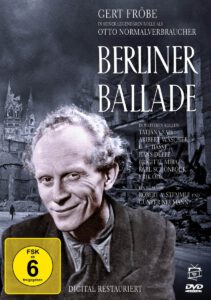
Berliner Ballade
Directed by: Robert A. Stemmle. Digitally restored, Booklet + Extras. DVD / Blu-ray. Filmjuwelen 2020.
Comment of the Jury:
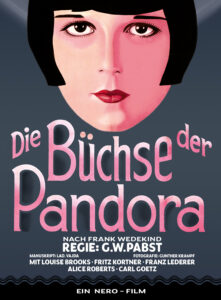
Die Büchse der Pandora
Directed by: Georg Wilhelm Pabst. DVD & Blu-ray. Mediabook, restored version. Booklet + Extras. Atlas-Film 2019.
Comment of the Jury:
Die Büchse der Pandora, restored in 2009, is the most famous silent film from director G. W. Pabst, starring Louise Brooks. The film is available on DVD and Blu-ray with a score composed by Peer Raben for ZDF/ARTE. Robert Fischer’s informative documentary Der Schatten meines Vaters: Michael Pabst über G. W. Pabsts Die Büchse der Pandora is included as a bonus feature. The 24-page accompanying booklet contains Martin Koerber’s restoration report, a write-up of a revival screening and a wide selection of contemporary reviews. Three postcards featuring different poster designs make a nice addition. This high-quality, informative and carefully compiled mediabook edition of the restored version of the film appears in the Nero Film series from Atlas-Film. Other German film classics have already been published in equally lavish and lovingly crafted editions, including Pabst’s Westfront 1918, Fritz Lang’s Das Testament Des Dr. Mabuse and Robert Siodmak’s 1930 classic of “New Objectivity” Menschen am Sonntag.
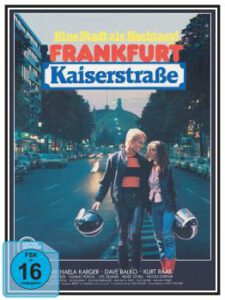
Frankfurt Kaiserstraße
Directed by: Roger Fritz. DVD & Blu-ray. Booklet + Extras. Subkultur 2019.
Comment of the Jury:
The “Edition Deutsche Vita” label has come to stand for consistently high-quality, lovingly produced and luxurious editions of West German genre films previously unavailable in DVD or Blu-ray format or available only in mediocre editions. This new release of director Roger Fritz’s cinematic swansong, Frankfurt Kaiserstrasse (1981), stands out among the most recent entries in the series, which now comprises 13 individual titles. In addition to the impeccable digital presentation of the main feature (available in both Blu-ray and DVD formats) and the extensive bonus material – which includes new video interviews with Fritz and leading actor Dave Balko, a recording of a live discussion with actor Hanno Pöschl from 2019, an image gallery and trailers – the package includes a 16-page booklet with an essay by Frankfurt-based cinéphile Gary Vanisian as well as a full reproduction of the 2nd version of Georg Ensor’s original screenplay (as a hardback!) and a brochure of glossy black and white photographs of Balko from the shooting.
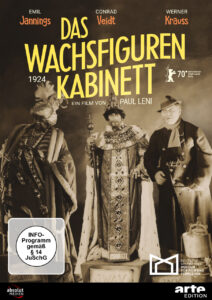
Das Wachsfigurenkabinett
Directed by: Paul Leni. Restored Version, Booklet + Bonusfilm. DVD / Blu-ray. absolut Medien 2020.
Comment of the Jury:
Thedifferent stories centered on the characters of Harun al Raschid, Ivan the Terrible and Jack the Ripper are told with great accomplishment, visual sophistication and the biggest film stars of the time (Emil Jannings, Conrad Veidt, Werner Krauß). Unfortunately, the original negative perished in a fire in 1925, and the film has survived only in the form of vintage prints. The new restoration drew mainly on a print from the British Film Institute and as such has English intertitles. The German titles have not survived. The Deutsche Kinemathek and the Cineteca di Bologna have now digitized and extensively restored the film, reproducing the color tinting of the British source print. The DVD and Blu-ray edition features a new score composed by Bernd Schultheis, Olav Lervik and Jan Kohl as well as an alternative piano soundtrack from Richard Siedhoff which does justice to the film in every respect. At the beginning of the surviving fragment of the documentary Der Film im Film (1923/24), included here as an extra, Paul Leni and Conrad Veidt can be seen briefly during the shooting of Wachsfigurenkabinett. The same fragment also includes footage of other silent film greats at work including directors Fritz Lang, E. A. Dupont and Hanns Schwarz. A booklet featuring contemporary reviews and an article about the restoration completes the edition.
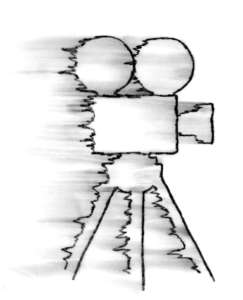
The Willy Haas Prize is awarded annually as part of the cinefest– International Festival of German Film Heritage to honor important international publications (book and DVD/Blu-ray) on German-language film.
Previous winners (Link leads to old website)


